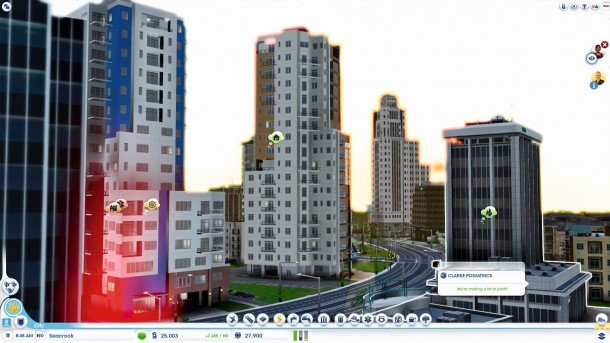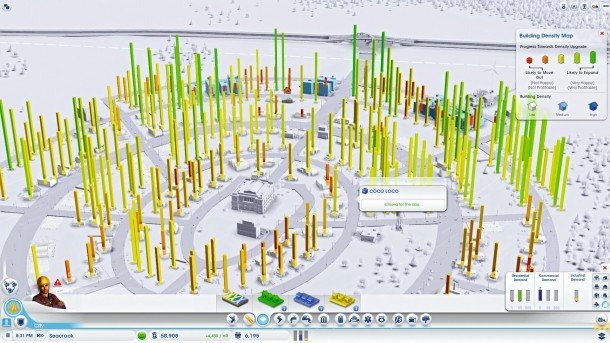SimCity hands-on: "clever, beautiful and terribly, terribly addictive"

It wasn't until I built a huge nuclear powerplant on the southern outskirts that I realised my city had no schools. I'd smashed my coal plants to make room for the beast, so it was nuclear or nothing. Unfortunately, nobody in Hobo Town was smart enough to run it properly. Should I shut it down and deny the city power, or let a band of idiots take control and risk a nuclear meltdown? I chose the second option. I am a terrible mayor.
"This level of detail comes with constraints. Towns are much smaller than SimCity fans will be used to."
I love that I can follow those unskilled workers to the nuclear plant every morning and tell them “please god don't set fire to the uranium” in the misguided hope that the words sink into their AI subroutines, but this level of detail comes with constraints. SimCity's towns are much smaller than fans of the series will be used to. Maxis reckon that the building size is equivalent to a medium map in previous SimCity games, but it feels smaller than that. That's partly because terrain elements like cliffs and water can render areas unbuildable, and partly because the new ability to build curved roads can result in beautiful but inefficient city layouts.
The boundary constraints are as much a design choice as a technological limitation. In SimCity you're encouraged to build a network of multiple cities spread across a pre-built chunk of terrain called a 'region'. You'll get several pre-ordained areas to build in, which can't be modified. Each town must specialise, and use its surpluses to sate the needs of the others. SimCities would be a more accurate name. I asked lead producer Kip Katsarelis why Maxis opted for this model.
“We wanted to put more game back into SimCity,” he told me. “We know there's going to be a sandbox, we know there's going to be crazy unlimited creativity, but we wanted to bring back more game. One of the things about game design is putting constraints around gameplay, because that's going to afford the players more decisions and put more control in their hands.”

City specialisations are built into the game as a series of advanced buildings that Maxis call “the big businesses.” These constructs can dramatically influence the look, tone and resource output of your city and offer a series of miniature challenges that bring some clear objectives to your sandbox tinkering.
"Big businesses can level up over time. A high-level gambling HQ unlocks new mega casinos with various exuberant themes."
I decided to turn Hobo Town into a gambling city and started scattering casinos throughout my residential zones. Once they'd earned a enough of revenue, I was able to build a gambling HQ, an ominous silver building that dwarfed my town hall. Like the town hall, big businesses can level up over time. A high-level gambling HQ unlocks new mega casinos with various exuberant themes. It wasn't long before I was dazzling my citizens with a glowing pink science fiction-themed establishment.
There's a good selection of specialisations to choose from, and they're entirely optional. If you don't fancy fleecing your citizens with a network of gambling joints, you can turn your town into a microcosm of Silicon Valley, full of sleek laboratories developing the technology of the future.
The biggest gaming news, reviews and hardware deals
Keep up to date with the most important stories and the best deals, as picked by the PC Gamer team.
Alternatively, you can place landmarks and build airports to create a top tourist destination. If you've ever fancied being an oil baron, you can set up a big oil corporation and start drilling the earth. Each HQ comes with its own set of challenges.
Hobo Town had reached maximum capacity when I started experimenting with big businesses. I had gone too far. My people were addicted to gambling, and I was addicted to building gambling buildings. I was knocking down peoples' houses to make room for 24-hour poker bars. It was time to move elsewhere and found a new town. A clean, germ-free place full of hope and, more importantly, water. Hobo Town was running dry. I needed a pipeline. Out of this single need, Aqua Town was born.
Part of the UK team, Tom was with PC Gamer at the very beginning of the website's launch—first as a news writer, and then as online editor until his departure in 2020. His specialties are strategy games, action RPGs, hack ‘n slash games, digital card games… basically anything that he can fit on a hard drive. His final boss form is Deckard Cain.


